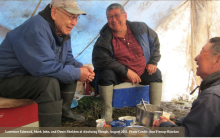Overview
Explore Yup'ik environmental knowledge of their land, named places, maps, language and values.
Since 2000, the Calista Elders Council (CEC) staff has worked with elders from Bering Sea coastal communities to document Yup'ik place names. Elders have been eager to teach young people their rich history and named places of their homeland, including camp and settlement sites, rivers, sloughs, rocks, ponds, even sandbars and underwater channels. More than 3,000 names have been identified with Yup'ik views on the importance of place names, the land, values, and language.
Supporting Yup’ik Education
One area of growth stemming from the Yup’ik Environmental Knowledge Project has been collaboration with the Lower Kuskokwim School District. Teachers and their students have participated in training sessions on atlas technology and how to add content. As part of the district’s curriculum development, high school students collect and share the history and culture of the Yup’ik way of life.
Fienup-Riordan, A. (2020). Yup'ik Environmental Knowledge Project (Community Page), Version 1 [Data Set]. https://doi.org/10.7265/27c5-gz36

